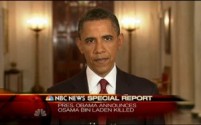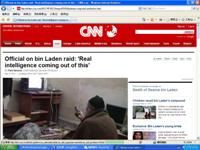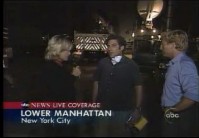




Still fresh from the cheesy royal wedding in England – an event that the international media reported ad nauseum– came the killing of US number one enemy. In a stroke of the pen, the killing of bin Laden sent the royal wedding to the back seat of the news agenda. Predictable though. After all the media are reactive and event-driven.
In this event-driven frenzy, the coverage of bin Laden’s execution was not only speedy but also plagued by allegations, errors and - worst of all - uncritical reporting.
Media put on the drip
New copies were plagued with wild allegations – most of them leaked from the White House propaganda machine - about the events surrounding bin Laden’s execution. Almost a week after the raid, the White House’s spin-doctors are still issuing “corrections” and “clarifications.”
As reported by The Nation: “The White House retreated Tuesday from its most provocative assertions about the operation to kill Osama bin Laden, acknowledging that the al-Qaeda leader was neither armed nor hiding behind a female ‘human shield’ when U.S. commandos fatally shot him during a predawn raid.”
In this speedy media frenzy, inexcusable errors were also committed. Take for example the embarrassing headline in page A2, May 3, of the Hong Kong’s South China Morning Post: “Obama bin Laden is dead, but the ‘war on terror continues.’” The correction and apology came next day: “In a headline on page A2 yesterday, the US president’s first name was erroneously given instead of that of Osama bin Laden. We apologise for the error.” Let’s be fair, the SCMP can’t claim exclusivity for this mistake.
There is no doubt the bin Laden’s story is gigantic and has all the newsworthy components to set the international news agenda. And this was precisely what has happened since the news broke on May 2. A survey conducted by the Program for Excellence in Journalism (PEJ) said: “The early wall-to-wall coverage of the bin Laden story accounted for an extraordinary 89% of the mainstream media newshole on May 2 and May 3.”
The story was huge and speculations abounded. Speculations abound when information is scarce. Marian Wang and Braden Goyette – from the excellent investigate on-line publication ProPublica – wrote that the media was left “scrambling for details on how it happened, where it happened, and what it all meant.”
Scrambling for details had the usual effect we – as journalists – know too well. Reporters tend to put more emphasis on speculations and opinions. When hard-facts – the staple of solid journalism - are blurred and hard to come by, journalists fill their copies with speculations and comments. While this is acceptable in news commentaries, it is not in straight news stories.
Almost two weeks after the raid, the murky details of the US actions in Pakistan have not been fully revealed. If the role of journalism is to uncover something that somebody doesn’t want to be known, the mainstream media is doing so far a lousy job.
But you can’t put all the blame on journalists. The well-staged and media managed US killing of bin Laden has been plagued by misinformation and a rather bizarre accounts of events. The killing of bin Laden was a staged managed international news spectacle. The release of the information was carefully selected; facts were manipulated or plainly denied. As we said in journalism, the media was put on a drip.
Kept on a drip, the corporate media have become a mere non-critical megaphone of the official version of the events. As Australian journalist and author Antony Loewenstein observed: “Most in the mainstream press have simply regurgitated White House propaganda without question, including key details of bin Laden’s death and lifestyle.”
Audiences are craving for answers that go beyond the what, where and when. In the case of major events – such as the bin Laden killing – they want explanatory stories. They want stories that will explain why the US decided – for example – to take bin Laden out instead to taking him to an international tribunal.
Jingoistic patriotic narrative
The story telling of the killing of bin Laden reminds us in part of the narrative witnessed in the post 9/11 terrorist attack. Examining the bin Laden’s story, the PEJ observed that in the US “the coverage so far has projected a greater sense of national unity.”
It is not only the “national unity” narrative but also the jingoistic “patriotic” account of events. Objectivity - the golden rule of US journalism exported to the rest of the western journalism– was put to rest.
Writing on New Matilda.com Stuart Rees reminds us of the New York Times coverage that “ran pages of admiration - at the expense of almost other news.” The New York Times praised the “brave Navy SEALs who killed this Satan of a man”.
In this narrative, words have been carefully selected. The word death has been more frequently used instead of the more accurate killing. The most common adjective has been daring. Last week The Economist wrote: “After a decade-long manhunt Osama bin Laden was killed in a daring raid.” How about calling it an illegal raid?
The news narrative of the mainstream media has become constructed as a clear cut action where the “bad-guy” has been killed by the “good-guys.” The PEJ observed that “the mainstream press found themselves reporting not only on an event of major consequence, but on an operation so viscerally daring and compelling it almost seemed more like the product of a Hollywood scriptwriter than the White House Situation Room.”
In this narrative – good for Hollywood but inadequate in journalism – the “bad-guy” was constructed as a coward living the high life. The Economist reported that the bin Laden was “found to have been living comfortably in an urban area.” This is not journalism. This is media propaganda in full swing. This narrative - constructed by the White House propaganda machine and regurgitated by the mainstream media – has “reinforced the shameful picture of him [bin Laden] hiding in a mansion while sending others out to fight and die.”
Perhaps, the mainstream media should start – as Slate.com suggested – dealing with the truth. “The fire-fight at Bin Laden’s compound, it now appears, pitted two or three men against a dozen or more commandos. Bin Laden didn’t engage in the firefight and used no human shield. He wasn’t even armed. We shot him dead anyway,” wrote Slate.
Journalism scholars called it “news frame.” It is the decision a journalist takes on what to emphasise in his or her story. It is a process of inclusion and exclusion.
Most media – especially the western media – have framed the killing of bin Laden as an action exempt from any illegality. Most media organizations have emphasised sources, facts and opinions celebrating the killing of bin Laden. Critical sources speaking about the illegal action by the US have been mainly absent from mainstream media.
This has been left to a small bunch of publications. In a commentary in Eureka Street.com writer and lawyer Moira Rayner reminded us that the “extra-judicial killings are, as Osama bin Laden’s death was, murder.” Rayner wrote: “His execution by agents of the sovereign people of the United States was a fundamental breach of Article 10 of the Universal Declaration of Human Rights.”
The need for a better coverage of terrorism
The coverage of bin Laden’s story has once again put the spotlight on the media’s ability to provide a comprehensive account of terrorism and terrorists. About their actions and motivations.
Since 9/11, the coverage of terrorism has been a specialized area of news reporting. In some schools of journalism, this coverage has been included in the curriculum, as a practical and theoretical area of study.
The need for a better coverage of terrorism was due to the realisation that journalists were not well equipped to cover this complex phenomenon. The main concern – as mentioned earlier – was that speculations and allegations tended to take a central stage instead of factual reporting.
Speculative journalism doesn’t enlighten. Speculative journalism – so prevalent when terrorist actions occur – tends to obscure even further the actions and motivations of terrorists. And in the case of bin Laden’s killing last week, it leaves too many questions without answers. In journalism parlance – it leaves stories with too many holes.
One of the features of news coverage of terrorism and terrorists – such as Osama bin Laden - has been the lack of stories framed around the social causes and goals of terrorism. Without backgrounds, political and historical, audiences are unable to understand the roots of terrorism, let alone solutions to this contemporary problem.
The problem of terrorism – a definer of contemporary international politics - won’t be resolved with the summary execution of bin Laden. It won’t end either the emergence of new terrorist leaders. This is the news narrative that should start prevailing in the mainstream media.
However, since the killing of bin Laden, most mainstream media have still failed to convey this message. There are exceptions though. Steve Coll - The New Yorker – is one of them. Coll warned us that al-Qaida wouldn’t disappear by taking out bin Laden.
Far from being a scare mongering exercise, the coverage of the killing of Osama bin Laden should warn people. And the warning is not only that terrorism is still among us, but also warning citizens of the possible repercussions when a democratic nation – such as the US – take an illegal act to stop it.
A quick look at old news clippings – a handy journalism activity, by the way– might be useful to contextualize the US action on May 2.
On November 17, 2001, political commentator Cokie Roberts on US ABC television program This Week stated: “Having Osama bin Laden on trial in the United States of America is a nightmare.” Roberts added: “with any luck, you know, he is—he is found dead.”
Well, bin Laden wasn’t precisely found dead last week in Pakistan. He was killed. The illegal killing of an evil terrorist is not justice. This is the truth that the media should start dealing with.


